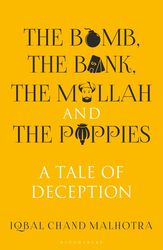Iqbal Chand Malhotra’s thoroughly researched book―The Bomb, the Bank, the Mullah and the Poppies―has laid bare the agenda of Pakistan’s ‘deep state’ and the murky world of how money was acquired from the heads of States and billionaires. It also explains the CIA’s links with drug dealers in Latin America, and how Pakistan’s generals garnered profits from Afghanistan’s poppy plantations. Add to this heady cocktail of pro-Pakistan characters like the Arab sheikhs―especially of Saudi Arabia and the UAE―all of whom gladly funded Pakistan’s quest for an Islamic nuclear bomb.
It all began with Zulfikar Ali Bhutto’s desire―after the humiliation of Pakistan’s defeat by India in the 1971 war―to acquire an atomic weapon to counter future Indian aggression. Bhutto laid the foundation for a team that would include nuclear experts like A.Q. Khan, and which would raise the money to fund Pakistan’s nuclear ambitions. Thus they created the BCCI (Bank of Credit and Commerce International) which, at one stage, became the fastest growing bank in the world; it had branches in Colombia, Luxembourg, London and, of course, Pakistan.
What is stunning is the millions of dollars that the BCCI received from the Abu Dhabi Investment Authority as a risk-free arrangement from 1980. But as the blessings of Abu Dhabi’s Sheikh Zayed were not enough to enter the exclusive world of white men-led banking, Pakistan’s shady banker-in-chief and the head of the BCCI, Agha Hasan Abedi, roped in Tom Clausen, chairman of the Bank of America, who invested $6,25,000 in the BCCI for a 30 per cent stake. This gave the BCCI the credibility to draw in investors and soon its network spread worldwide. This money filled the coffers of Pakistan’s nuclear fund handled by generals and politicians, from General Zia-ul-Haq to, eventually, Pervez Musharraf, Nawaz Sharif and Benazir Bhutto, and their cronies who monitored the poppy plantations of Afghanistan along with the Taliban’s pliable tribal chiefs.
In all these years, Khan, called the father of Pakistan’s bomb, had built the required facilities to produce atomic bombs―some say in hundreds―that were enough for terrorists to create mayhem! Khan was then formally encouraged to look at exporting bombs, and the related knowhow, to North Korea, Iran and Libya for a price. Ironically, US intelligence agencies―the chief patrons of non-proliferation―knew of the rot in Pakistan’s ‘deep state’. CIA’s dossiers named the players and the money in this ‘great game’ that the author of this fascinating book has listed out, authenticating all his information with endnotes and a detailed bibliography. It makes it hard, therefore, to dismiss his work as one of fiction.
The BCCI― Pakistan’s ‘bank of crooks and criminals international’, as someone once called it―had to be shut down in the summer of 1991 by the Bank of England, as the evidence against its money trail from drug lords in Latin America to Afghanistan became too hard to hide.
But by then, Pakistan had its nuclear bomb through deceitful and dubious means, and it now remains the crown jewel of the Pakistan army. The irony is that, none of the players in this great game has been brought to book, especially by the US which had its hands deeply soiled in this messy game, as the author of this book has brought out with encyclopedic inputs. As an eminent public personality stated recently, India’s intelligence agencies would gain from getting a copy of this book, and so would all those who delude themselves about Pakistan’s well-meaning initiatives.
THE BOMB, THE BANK, THE MULLAH AND THE POPPIES
By Iqbal Chand Malhotra
Published by Bloomsbury
Price Rs799; pages 223


